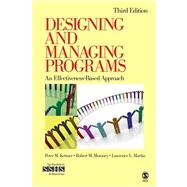
| Preface | |
| Assessing Current Practices | |
| Contemporary Issues in Social Service Program Planning and Administration | |
| Chapter Overview | |
| The Era of Accountability | |
| The Logic Model | |
| Community Focus | |
| The Issue of Effectiveness | |
| Assessing an Existing Program | |
| What Is Effectiveness-Based Program Planning? | |
| Using Effectiveness Principles to Understand Existing Programs | |
| Problem Analysis/Needs Assessment | |
| The Contribution of Theory to Program Planning | |
| Chapter Overview | |
| The Use of Theory in Program Planning | |
| Theory of Practice | |
| Theory in Practice | |
| Theory of Program Planning | |
| Types of Planning | |
| Theory in Program Planning | |
| Understanding Social Problems | |
| Chapter Overview | |
| Addressing Social Problems | |
| Stating Problems as Solutions | |
| The Need for a New Approach | |
| Identifying a Social Condition | |
| Defining Problems | |
| Frameworks for Problem Analysis | |
| Needs Assessment: Theoretical Considerations | |
| Chapter Overview | |
| The Concept of Need | |
| Theoretical Understandings of Need | |
| Needs Assessment and the Planning Process | |
| Factors Influencing the Definition of Need | |
| Different Perspectives on Need | |
| Need Categories and the Planning Process | |
| Determining Who Is in Need | |
| Two Major Problems: Reliability and Availability of Data | |
| Needs Assessment: Approaches to Measurement | |
| Chapter Overview | |
| Methodologies Used in Measuring Need | |
| Extrapolating From Existing Studies (Normative Need) | |
| Using Resource Inventories (Normative Need) | |
| Using Service Statistics (Expressed Need) | |
| Conducting a Social Survey (Perceived Need) | |
| Holding a Public Forum (Perceived Need) | |
| Selecting the Best Method | |
| Approaches Useful for Locating Concentrations of High-Risk Groups | |
| Concluding Comments on Needs Assessment | |
| Planning, Designing, and Tracking The Intervention | |
| Selecting the Appropriate Intervention Strategy | |
| Chapter Overview | |
| The Program Hypothesis | |
| Types of Program Hypotheses | |
| The Process of Developing a Program Hypothesis | |
| Program Hypotheses and the Idea of Consequences | |
| From Program Hypothesis to Service | |
| Incorporating Problem Analysis Into Program Design | |
| Setting Goals and Objectives | |
| Chapter Overview | |
| Goals and Objectives: A Framework for Action | |
| From Program Hypothesis to Goals and Objectives | |
| The Function of a Mission Statement | |
| The Formulation of Goals | |
| The Formulation of Objectives | |
| Requirements for All Objectives | |
| Outcome Objectives | |
| Process Objectives and Activities | |
| Integrating Outcome Objectives, Process Objectives, and Activities | |
| Designing Effective Programs | |
| Chapter Overview | |
| The Significance of Program Design | |
| Designing the Elements of a System | |
| Defining the Elements of a Program | |
| The Relationship Between Objectives and System Components | |
| Specifying the Program Hypothesis | |
| Using Management Information | |
| Chapter Overview | |
| Documentation Practices in Social Services | |
| Designing a Data Collection System for a Program | |
| Calculating The Costs and Value of The Intervention | |
| Budgeting for Control, Management, and Planning | |
| Chapter Overview | |
| The Differences Between Budgeting and Accounting | |
| The Principal Purposes of Budgeting | |
| Budgeting and the Systems Framework | |
| Models of the Budgetary Process | |
| Major Budgeting Systems | |
| Dealing With Revenue Increases and Decreases | |
| Budgeting in Social Service Agencies Today | |
| Line-Item, Functional, and Program Budgeting Systems | |
| Chapter Overview | |
| The Focus of Major Budgeting Systems | |
| Line-Item Budgeting Systems | |
| The Link Between Line-Item Budgeting and Functional and Program Budgeting | |
| Functional Budgeting Systems | |
| Program Budgeting Systems | |
| A Comprehensive Budgeting System | |
| Performance Measurement, Monitoring, and Program Evaluation: Data Requirements | |
| Chapter Overview | |
| The Link Between Performance Measurement, Monitoring and Evaluation, and Management Information Systems | |
| Feedback and Self-Evaluating Systems | |
| Performance Measurement | |
| Monitoring | |
| Program Evaluation | |
| Program Data Requirements | |
| Performance Measurement, Monitoring, Program Evaluation, and Program Data | |
| The Utility of Performance Measurement, Monitoring, and Program Evaluation | |
| Program Impact Evaluation and Hypothesis Testing | |
| Chapter Overview | |
| Differentiating Program Evaluation From Performance Measurement | |
| Impact Program Evaluation | |
| Impact Program Evaluation and Hypothesis Testing | |
| Research Designs for Impact Program Evaluation | |
| A Concluding Comment | |
| About the Authors | |
| Table of Contents provided by Ingram. All Rights Reserved. |
The New copy of this book will include any supplemental materials advertised. Please check the title of the book to determine if it should include any access cards, study guides, lab manuals, CDs, etc.
The Used, Rental and eBook copies of this book are not guaranteed to include any supplemental materials. Typically, only the book itself is included. This is true even if the title states it includes any access cards, study guides, lab manuals, CDs, etc.